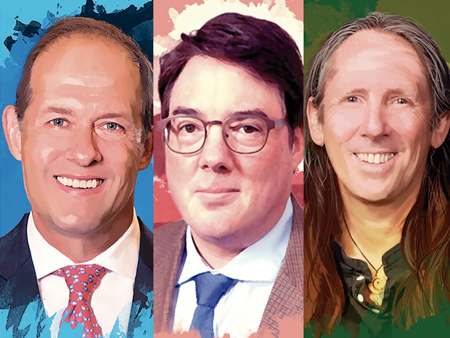Fairfield hosted more than 1,000 leaders in business, healthcare, and higher education for a virtual summit on innovation in a time of change.
The roots of higher education are not institutional-based, they’re individual...
— Mark R. Nemec, PhD, University President
Crisis has a way of redefining what leadership really means, and the year 2020 has been no exception.
Over the past 10 months, industry leaders in healthcare, higher education, and corporate America have watched as the pandemic, and deepening social tensions, have rendered the idea of “business as usual” meaningless.
Some argue we are witnessing a shift between yesterday’s age of standardization across all fields — the one-size-fits-all model of education, healthcare provision, and business leadership — toward a growing demand for ever-increasing personalization.
From October 28-30, nearly 1,000 registrants from more than 600 U.S. businesses and organizations — including University President Mark R. Nemec, PhD, and other Fairfield faculty and alumni – gathered online to examine this national shift in leadership during a free, three-day virtual summit hosted by Fairfield University’s College of Arts and Sciences at The Westport Library.
Presented by Glenn Llopis Group (GLLG), a nationally recognized business strategy firm, with support and artistic storytelling interludes commissioned by the Regina A. Quick Center for the Arts, the 2020 Leadership in the Age of Personalization Summit brought together more than 45 executives and experts to analyze what has been learned from the pandemic and how to shape the future of healthcare, corporate America, and higher education.
“These crises have revealed the fragility of our systems in real time,” said Glenn Llopis, GLLG president and founder of the Leadership in the Age of Personalization movement. “Healthcare, corporate America, and higher education can no longer be viewed in silos anymore. Each sector needs the others, and how we respond to this convergence will determine what our collective future will look like.”

Rich Miller-Murphy - Executive Director, Laboratory and Medical Services at New York Blood Center Enterprises.
On Day One of the summit, leaders from major healthcare organizations including CVS Health, Cancer Treatment Centers of America, and City of Hope examined lessons learned from Covid-19 and the rapid evolution of personalized care during a time when patients want to be seen and treated as individuals.
Throughout the afternoon, healthcare experts such as Fairfield alumnus Rich Miller Murphy ’78, executive director of laboratory and medical services for New York Blood Center Enterprises shared their experiences with telehealth, digital therapeutics, and other forms of personalized virtual care.
On Day Two, the conference’s focus shifted to new challenges being faced by corporations. Discussions centered on finding the proper balance between standardization and personalization inside the workplace, and how to pursue inclusion as a growth strategy.
Panelists lending their voices to the conversation included Dalana Brand, head of diversity and inclusion for Twitter; Stephanie Llyod, founder and president of the Toggle brand and head of new ventures for Farmers Insurance; and Nik Modi, managing director at RBC Capital Markets.

Bill Hulseman - Independent Consultant, Academia.
“We all know we need to do something differently, we just need the courage to invest and experiment,” Modi said. “The fear of experimentation can’t be a barrier anymore, because not experimenting means we get deeper into a state of standardization, and that leads to mediocrity, and ultimately, obsolescence.”
On the final day, the summit’s national conversation on higher education featured Fairfield University President Mark R. Nemec, PhD; Dean Richard Greenwald, PhD and Associate Dean Scott Lacy, PhD, of the College of Arts and Sciences; educational consultant Bill Hulseman ’98; and Erin Moran ’05, head of industry education at Google.
President Nemec and his colleagues examined how today’s crises have accelerated what a “student-centered” approach means in terms of curriculum, teaching, and research.

Erin Moran - Head of Industry, Education at Google
“The roots of higher education are not institutional-based, they’re individual... the idea being that the instruction and formation of one individual – and in our case, an individual of purpose – is really at the core of what we do,” Dr. Nemec stated during the morning kick-off session. “While this current moment feels so fraught and full of challenges, we as a Jesuit Catholic institution start every day with gratitude, and in my mind, gratitude is about optimism. So I would say that while the moment seems very challenging ... there are learnings that can come out of this pandemic that we hope will enhance how we think about the delivery of instruction and the maintenance of our community.”
Dr. Lacy, who was instrumental in organizing and co-hosting this year’s summit, expressed his pride in the University for taking the lead in facilitating this national discussion.
“By engaging in collaborative, insightful, and forward-thinking conversations like these,” he said, “we can connect and learn from one another to inspire and create meaningful change, and new and emboldened relationships.”
To learn more about the Leadership in the Age of Personalization Summit or to watch a full recording of the event, visit 2020summit.ageofpersonalization.com.







